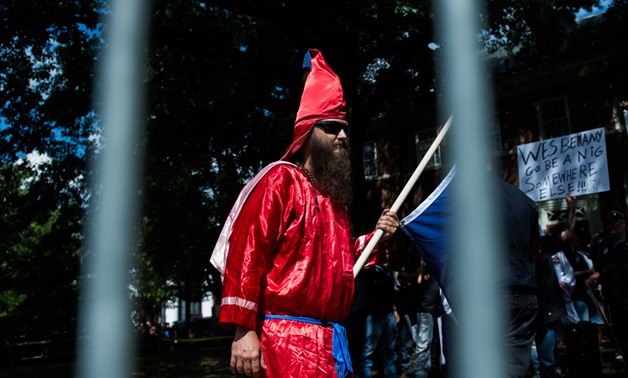
Members of the Ku Klux Klan call for the protection of Southern Confederate monuments, in Charlottesville, Virginia on July 8, 2017. Andrew Caballero-Reynolds, AFP
Charlottesville, United States - 9 July 2017 : Supporters of the white supremacist Ku Klux Klan marched in Charlottesville, Virginia on Saturday to protest the planned removal of a statue of General Robert E. Lee, who oversaw Confederate forces in the US Civil War.
The Klan marchers were met by hundreds of jeering counter-protesters in this quiet university town, where the protest by the notorious white power group was authorized by officials in Virginia on free speech grounds.
As the demonstration got underway, dozens of marchers -- some carrying Confederate flags, a few in the distinctive white hood worn by Klan members -- paraded past hundreds of people shouting "racists go home!" and other chants.
The two groups were separated by a metal barricade and a phalanx of armed police.
Critics say the far right, both here and across the United States, has been energized by Donald Trump's election to the presidency.
Be it the Ku Klux Klan, the alt-right or generic white supremacists, these conservatives have found a new cause in defending the Confederate flag and monuments in the US South that recall the era of slavery.
They are outdated, awful symbols of racism for many Americans, who are mobilizing to have them taken down from public places.
Anti-Klan protesters in Charlottesville got an early start overnight, throwing red paint on the bronze equestrian statue of the saber-wearing Confederate general. City workers were scrubbing the paint off early Saturday.
Watching the scene, Mason Pickett, a 60-ish retired businessman, said he regretted the decision by Charlottesville -- which he said had become an "ultraliberal city, even socialistic" -- to remove the statue.
"Statues can be good history, they can be bad history -- you may not like it and you may love it, but it's history," he said.
But Tina Young, a 49-year-old lawyer, said it was past time to remove signs of the state's Confederate past. Virginia and other Southern states had had plenty of time to do so, she said.
"In Washington, DC, they have put up a Martin Luther King statue, they have an Afro-American museum, they have a Jewish museum, they made the public space more fair and balanced," she said.
As to Robert E. Lee, she added, "he did represent slavery, he did fight a war against our government which killed thousands and thousands of soldiers, he could have chosen the better side but he didn't."
The debate is taking place in many former Confederate states, from Louisiana to Georgia and the Carolinas, and even in Washington, where a stained glass window in the National Cathedral depicts a Confederate soldier. Slaves in Washington were freed only a year after the start of the Civil War.
No major battle in that 1861-1865 war was fought in Charlottesville, population 50,000. But its passions have been stirred.
A pro-Democratic town linked to the university founded in 1819 by retired president Thomas Jefferson, people in Charlottesville said they abhor the planned arrival of members of the Loyal White Knights of the Ku Klux Klan, a small white supremacist group based in North Carolina.
Many say they plan to stay away from the park where white supremacists plan to gather.
Others plan prayer services or peaceful meetings designed to show their rejection of racial intolerance.
All around, police have put up barriers and taken positions in hopes of averting any violence.
The Charlottesville police department, run by a black man, has arranged a massive security detail to keep the peace.
"I hope it doesn't turn violent," said Young, the lawyer. "We don't need more violence in this world."
In the end, the KKK adherents who turn out might only come to a few dozen. But they have warned they will be armed -- as Virginia's "open carry" law allows -- and ready to defend themselves if attacked.
The KKK members will not be allowed to wear the pointy white hoods so emblematic of the group. The flowing white robes that were also part of the costume associated with lynchings and cross burnings against the night sky have faded away over time.
In this town of handsome red brick buildings, the decision in February to remove the Lee statue after years of debate has left deep wounds.
And it is actually on hold: a judge suspended the town council's narrow decision for six months until a court reviews the case.
"Robert E. Lee has a lot of admirers across the South, partly because Southern education has taught that he was this noble man who was a gentleman and worked very hard after the war for reconciliation," said Kristin Szakos, the town councillor behind the drive to bring down the statue.
"For a lot of people he is also more problematic, especially in the statue where he is depicted in full battle gear, riding against the United States of America," she added.
"We have lots of ways to learn history that aren't giant statues overlooking our downtowns."
In its heyday in 1925, the KKK had as many as four million members.
These days it has from 5,000 to 8,000, mainly in the deep South, according to the Southern Poverty Law Center, which monitors and studies extremism in America.


Comments
Leave a Comment